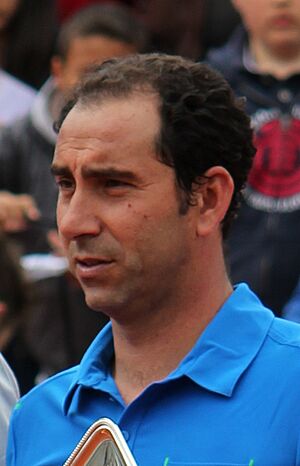Albert Costa facts for kids

Albert Costa in 2012
|
|||||||||||
| Country (sports) | |||||||||||
|---|---|---|---|---|---|---|---|---|---|---|---|
| Residence | Barcelona, Spain | ||||||||||
| Born | 25 June 1975 Lleida, Spain |
||||||||||
| Height | 1.80 m (5 ft 11 in) | ||||||||||
| Turned pro | 1993 | ||||||||||
| Retired | 2006 | ||||||||||
| Plays | Right-handed (one-handed backhand) | ||||||||||
| Prize money | $7,673,478 | ||||||||||
| Singles | |||||||||||
| Career record | 385–273 (58.51%) (58.5%) | ||||||||||
| Career titles | 12 | ||||||||||
| Highest ranking | No. 6 (22 July 2002) | ||||||||||
| Grand Slam singles results | |||||||||||
| Australian Open | QF (1997) | ||||||||||
| French Open | W (2002) | ||||||||||
| Wimbledon | 2R (1996, 1998) | ||||||||||
| US Open | 4R (2001) | ||||||||||
| Other tournaments | |||||||||||
| Tour Finals | RR (1998, 2002) | ||||||||||
| Olympic Games | 2R (1996) | ||||||||||
| Doubles | |||||||||||
| Career record | 30–57 (34.48%) (34.5%) | ||||||||||
| Career titles | 1 | ||||||||||
| Highest ranking | No. 102 (12 January 2004) | ||||||||||
| Grand Slam doubles results | |||||||||||
| Australian Open | 3R (2005) | ||||||||||
| Wimbledon | 1R (2003) | ||||||||||
| US Open | 1R (2003) | ||||||||||
| Team competitions | |||||||||||
| Davis Cup | W (2000) | ||||||||||
|
Medal record
|
|||||||||||
Albert Costa Casals was born on June 25, 1975. He is a former professional tennis player from Spain. He is most famous for winning the men's singles title at the French Open in 2002.
Contents
Albert Costa's Tennis Journey
Albert Costa started playing tennis when he was just five years old. He quickly became known as a talented junior player. In 1993, he reached the junior final at the French Open and won the Orange Bowl, a big junior tournament.
He became a professional tennis player later that year. Albert was especially good on clay courts, which are tennis courts made of crushed brick, shale, or stone. A Spanish commentator once called him "the man with two forehands" because he could hit both his forehand and backhand shots with great power and accuracy. In 1994, he won two smaller tournaments and was named the ATP's Newcomer of the Year.
Early Career Wins
Albert won his first major singles title in 1995 at Kitzbühel. He beat Thomas Muster, who was known as the "King of Clay" at the time. This win was very important because it ended Muster's amazing streak of 40 wins in a row on clay courts.
Albert won three more titles in 1996. In 1997, he won two more singles titles and helped the Spanish team win the World Team Cup. He added two more singles titles in 1998, including a big event in Hamburg.
Davis Cup and Olympic Success
In 2000, Albert helped Spain win its very first Davis Cup, which is a major international team competition in men's tennis. That same year, he also won a bronze medal in men's doubles at the Olympic Games in Sydney. He played with his partner, Álex Corretja.
Winning the French Open in 2002
When the French Open started in 2002, Albert Costa was not expected to win. He hadn't won any tournament titles since 1999. However, he surprised everyone!
He was the 20th seed in the tournament. He beat several strong players, including Gustavo Kuerten, who had won the French Open twice before. In the quarterfinals, he had a tough five-set match against Guillermo Cañas and won. Then, in the semifinals, he played against his friend and fellow Spaniard, Àlex Corretja, and won in four sets.
In the final match, Albert played against another Spanish player, Juan Carlos Ferrero. Many people thought Ferrero would win because he had been playing very well. But Albert played an incredible match, winning in four sets: 6–1, 6–0, 4–6, 6–3. This was his first ever Grand Slam title, which is one of the four most important tennis tournaments in the world. This big win helped him reach his highest ever ranking, World No. 6, in July 2002.
In 2003, Albert returned to the French Open as the defending champion. He played many long matches, winning four five-setters. He made it to the semifinals again but was eventually defeated by Juan Carlos Ferrero, who went on to win the title that year.
Retirement and Coaching
Throughout his career, Albert Costa won 12 top-level singles titles. In 2005, he also won his first doubles title in Doha, playing with Rafael Nadal.
Albert announced his retirement from professional tennis on April 21, 2006. He mentioned that he had some injuries and felt he no longer had the same strong desire to compete. His last tournament was in his hometown of Barcelona.
After retiring, Albert became the captain of Spain's Davis Cup team in December 2008. He was a very successful captain, leading Spain to win two Davis Cup titles in 2009 and 2011. He then passed the captaincy to Àlex Corretja. Albert also coached ATP professional player Feliciano López.
Albert Costa's Personal Life
When Albert was growing up, his tennis hero was John McEnroe. Besides tennis, he enjoys playing cards, table tennis, golf, and soccer. He is a big fan of the Barcelona soccer team and his hometown team, UE Lleida. He also looks up to famous athletes like Michael Jordan, Tiger Woods, and Ronaldo.
Less than a week after winning the French Open in 2002, Albert Costa married his long-time girlfriend, Cristina Ventura. His friend and fellow tennis player, Àlex Corretja, was the best man at their wedding. Albert and Cristina have twin daughters named Claudia and Alma, who were born on April 21, 2001.
Images for kids
See also
 In Spanish: Albert Costa para niños
In Spanish: Albert Costa para niños
 | Audre Lorde |
 | John Berry Meachum |
 | Ferdinand Lee Barnett |


